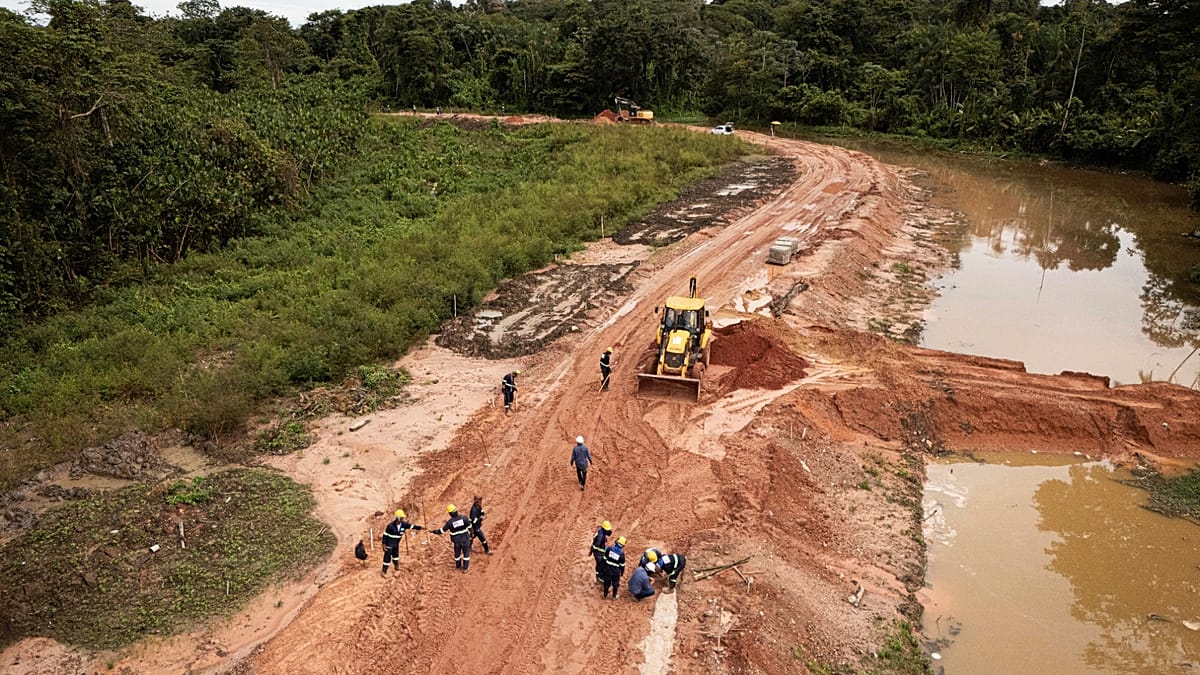
The Brazilian government has been accused of intentionally chopping down 100,000 Amazon trees in the northern state of Pará, as part of a plan to build a four-lane motorway close to the city of Belém, in order to facilitate access to the United Nations’ Climate Conference, COP30.
While the United States’ withdrawal from the Paris Agreement has weakened collective momentum, the EU remains the world’s largest contributor to climate finance, with leaders and climate industry figures travelling to the event, which is taking place between 6 and 21 November.
US President Donald Trump chimed in on these claims, purporting on his Truth Social platform that Brazil’s rainforest was ripped apart to allow “environmentalists to travel”.
Meanwhile, other social media users responded to European Commission President Ursula von der Leyen’s X post about the importance of COP30, by highlighting the supposed “irony of desecrating the iconic rainforest to host a climate summit!”
But in reality, the allegations are misleading, as the story is more complex than it appears, and many online users are intentionally spreading the claims to discredit the event and fuel climate disinformation.
The breakdown
The controversial Avenida Liberdade, a four-lane 13km highway which cuts across the Amazon, has been in the works since 2012 and was officially announced in 2020 — before the official announcement in 2023 regarding Brazil hosting the UN’s Climate Conference.
The idea was to connect Marituba — a neighbouring city of Belém — with the capital, in a bid to ease congestion on existing key roads.
Construction of the road began in June 2024, but has been put on hold on multiple occasions due to protests and local outrage against the project and a perceived lack of consultation.
In March 2025, the BBC published an article about the highway, which further fuelled the controversy.
In the article, the state’s infrastructure secretary, Adler Silveira, was quoted as stating that the road featured among 30 projects that Belém was developing to “prepare” and “modernise” itself, to ensure a “legacy for the population and, more importantly, serve people for COP30 in the best possible way”.
However, COP organisers reacted to the publication of the BBC’s article, titled “Amazon forest felled to build road for climate summit”, by stating that the construction of the road did not fall “under the responsibility of the federal government” or “the 33 infrastructure projects planned for COP30.”
Although the 13km motorway is not part of the official list of COP30 projects set out by Brazil’s federal government, local media reports suggest that momentum for building the road intensified ahead of the event, as part of a drive to improve infrastructure for it.
In an article published by local media outlet Pará Terra Boa, Silveira presented a series of projects which aimed to improve mobility in the state of Pará, including the Avenida Liberdade, stating that “COP is an event that will precisely accelerate all of this within the context of infrastructure”.
Despite this, Rafael de Pino, a journalist based in Brazil who has been covering climate disinformation, told Euronews’ verification team The Cube that “if the governor of Pará announces a road project as part of preparations for COP30, that does not make it an official COP30 project, let alone ‘a four-lane highway for environmentalists to drive on'”.
Ultimately, the road has not actually been completed, with local authorities stating that they aim to finish it by early 2026.
Controversy lingers
A number of indigenous communities live close to the Avenida Liberdade, condemning a lack of consultation around the project, a sense of being increasingly surrounded by infrastructure, as well as concerns around food insecurity, in light of many individuals living off local farming.
Since 2016, the state of Pará has held the yearly record for deforestation within Brazil.
“In 2024 alone, 1,260 square kilometres of Amazon rainforest were destroyed,” de Pino said. “This deforestation is driven mostly by agribusiness, over 90% according to MapBiomas, to open new pastureland. Part of this sector also funds the climate disinformation machine, as reported by Agência Pública.”
“The ongoing silence about these numbers, even with COP30 taking place in Belém, is deeply concerning,” he added.
Brazil set out to host this year’s COP30 with a commitment to spotlighting Indigenous people, whose way of life depends on the Amazon rainforest.
On Saturday, activists and Indigenous people took to the streets of Belém, as part of the largest protest staged outside a COP event since COP26, which was held four years ago in Glasgow.
Last week, Indigenous people also staged protests which disrupted entry to the conference hall.
